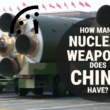Hypersonic missiles: Junk nobody needs
By Mark Gubrud, July 24, 2015
Last September in the Bulletin, I proposed a moratorium and eventual ban on hypersonic missile testing. The following month, US Air Force Lt. Col. Jeff Schreiner proposed a similar idea in Stars and Stripes. The principal obstacle to enacting this proposal is just skepticism—the same skepticism that every successful arms control initiative initially encounters.
My roundtable colleagues Rajaram Nagappa and Tong Zhao are skeptical about a test ban, but they make no argument for hypersonics. Zhao believes a test ban is unlikely to be instituted but “would love to be proven wrong.” Nagappa portrays hypersonics as offering little beyond “destabilization and perhaps even an escalatory conflict scenario.” But he believes that a test ban must wait until after the weapons have been perfected.
Nagappa suggests in Round Two that the 1963 ban on atmospheric nuclear tests came about because nuclear weapons had been perfected by that point. But I believe that, following the 1962 Cuban Missile Crisis, governments were compelled to act by worldwide outrage over the threat of nuclear war and the radioactive poisoning of air and water. “What have they done to the rain?” asked a song of the day. Today, as nations senselessly reheat the arms race, I want people to ask “What are they doing to tomorrow?”
As Nagappa observes, the development of not only hypersonic missiles but also antisatellite weapons is accelerating—and I would add autonomous weapons and other categories to this list. Analysts and nongovernmental organizations, rather than keeping a finger in the wind, must call for a change in direction.
Misguided faith. As an American, I urge my own government to take the lead in preventive arms control—not lead a race toward new danger. I don’t feel entitled to tell other nations’ governments they should set a better example than Washington does. But I am confident of this: Hypersonic missiles will not strengthen anyone’s national security.
Proponents of hypersonic missiles incant that “the race is on” to gain “a huge strategic advantage.” Yet nobody seems able to clarify just what the advantage would be. As Zhao writes, “the conviction that technological innovation is the best way to address security challenges is close to an unshakable religion” in the United States—but this religion is not restricted to one country. Russia and China display the same misguided faith by pursuing hypersonics as a counter to ineffective US missile defenses.
There is little reason to believe that hypersonic missiles would be harder to intercept than ballistic missiles. Hypersonics' ability to perform evasive maneuvers is often cited, but their ability to see interceptors coming would be severely limited by the heat involved in hypersonic flight and by corrosive effects on sensors. Ballistic missiles also could be equipped with maneuver capabilities, and could see interceptors. Ballistic missiles can also be hidden among lightweight decoys, whereas hypersonics would always be highly observable by radar and infrared sensors.
US officials tout hypersonic missiles as alternatives to nuclear weapons for strategic strikes, but without nuclear warheads they would be incapable of destroying many hard, fixed targets. They could not be made stealthy, and would have difficulty using sensors for precise navigation—or to locate and home on mobile targets that might scoot before the missiles arrive.
As Nagappa points out, a nation possibly under attack can’t tell where a hypersonic missile is going or whether it carries a nuclear warhead. And as Zhao writes, "Any strategy that blurs the line between conventional and nuclear warfare should be rejected.” But it’s just as risky to bet that the peril of nuclear war can ever be removed from any war between nuclear powers.
I don’t worry so much about definitions, distinctions, or other technical problems of arms control for hypersonic missiles, nor about some nation circumventing a ban through the putatively peaceful development of space plane technology. A sudden “breakout” from a hypersonic missile test ban couldn't be kept secret in any case. It would confer no decisive or immediately usable military advantage, and other nations would simply follow suit. The defector would only have blown the opportunity to avoid another round of a stalemated yet very dangerous arms race.
Let’s grasp that opportunity while it still exists. Hypersonic missiles are junk.
Topics: Nuclear Weapons, Technology and Security
Share: [addthis tool="addthis_inline_share_toolbox"]














